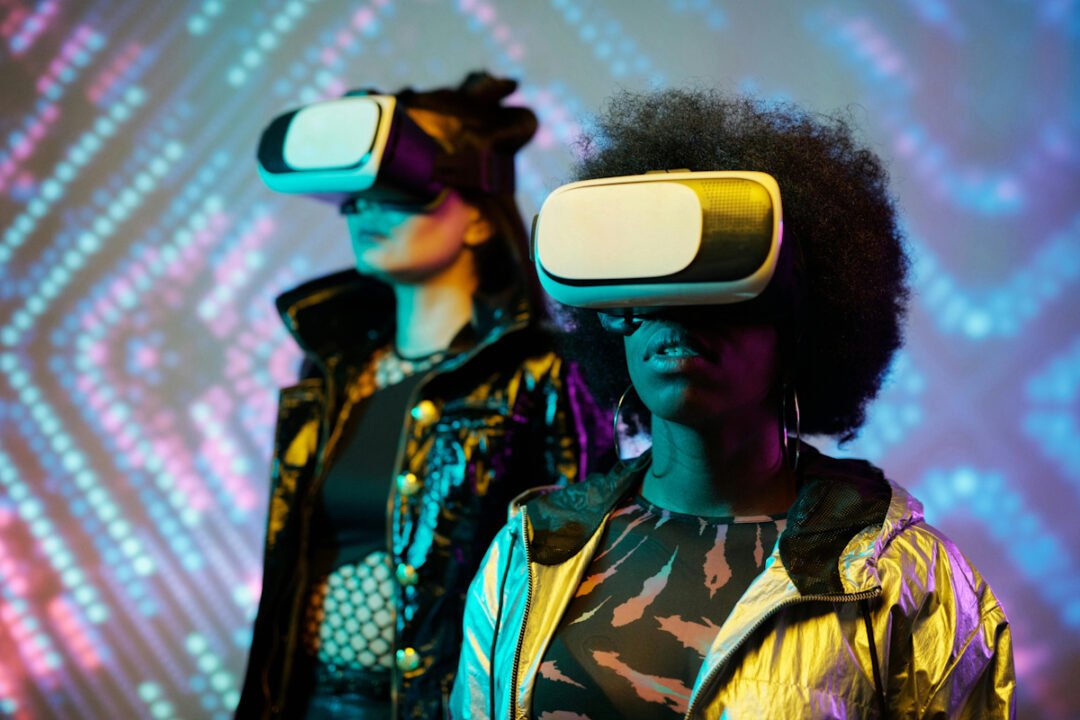In today’s fast-paced world, event organisers constantly seek new ways to captivate and engage attendees. Whether it’s a conference, trade show, or music festival, the success of an event often hinges on the overall attendee experience. This is where innovative event technologies come into play. These cutting-edge technologies can transform attendees’ interactions with events, from virtual and augmented reality to event apps and interactive displays. This blog will explore how innovative event technologies enhance the attendee experience, create unforgettable moments, and leave a lasting impact. Join us as we delve into the world of event tech and discover how it revolutionises how we experience events.
Innovative Event Technologies: Enhancing the Attendee Experience

Technology in Event Management
Technology plays a crucial role in the event management industry, revolutionising how events are planned, organised, and executed. From event registration and ticketing to event marketing and attendee engagement, technology has become essential for event professionals to streamline processes, enhance efficiency, and deliver a seamless event experience.
Innovative Event Technologies
From virtual and augmented reality to event apps and live streaming, we will dive into how these innovative technologies transform how events are designed, experienced, and remembered. Stay tuned for insightful articles, expert interviews, and case studies that will inspire you to embrace the future of event technology.
Enhancing the Attendee Experience with Technology
One of the key benefits of technology in the event industry is its ability to enhance the attendee experience. Event apps help attendees quickly access event information, personalise their schedules, network with other participants, and provide real-time feedback. Furthermore, technologies like RFID wristbands and interactive displays can create immersive and personalised event experiences, leaving a lasting impression on attendees. In this blog, we will explore how technology elevates the attendee experience and makes events more engaging and memorable.
Personalised Services: Tailoring the Experience to Your Guests
In the world of event management, prioritising attendee satisfaction is crucial. One way to achieve this is by integrating technology into your events. With the help of AI, personalised services can be offered to each guest, ensuring a tailored experience that leaves a lasting impression. Wearable tech allows instant access to information, making it easier for guests to navigate the event. Data analytics play a vital role in making better decisions, while tracking metrics and guest feedback helps identify trends and areas for improvement. By embracing these advancements, future events can be enhanced and exceed guest expectations.
Benefits of personalised services in event management
Personalised services in event management offer numerous advantages for event organisers and attendees. Organisations can enhance attendee satisfaction and engagement by tailoring the event experience to individual preferences. From customised event agendas to personalised communication and networking opportunities, personalised event management can create a more enjoyable and memorable experience for everyone involved.
AI-Driven Personalised Recommendations
Artificial intelligence (AI) technology can significantly enhance the personalisation of event management. AI algorithms can generate personalised recommendations and suggestions by analysing attendee data and preferences. These can include personalised session recommendations based on interests and past attendance, networking suggestions to facilitate meaningful connections, and even personalised catering options based on dietary preferences or restrictions. Utilising AI in event management can ensure attendees have a highly tailored and relevant experience.
Enhancing Event Experience with Wearable Technology
Wearable technology presents a unique opportunity for customising the event experience. Event organisers can collect real-time data on attendees’ behaviour and preferences using wearable devices such as smart badges or wristbands. This data can then be used to personalise various aspects of the event, such as offering personalised session recommendations, providing personalised wayfinding and navigation assistance, or even customising lighting and ambience based on individual preferences. Customising the event experience with wearable technology can elevate the overall attendee experience and create a more immersive and engaging event environment.
Instant Information Access: Enhancing Attendee Engagement
Instant information access is a crucial factor in enhancing attendee engagement at events. With technological advancements, event management has integrated various tools to offer personalised services tailored to your guests. Event organisers can make better decisions and identify trends using artificial intelligence, wearable tech, data analytics, and tracking metrics. This leads to improved future events, where guests can instantly access information and enjoy a more engaging experience.
Harnessing the power of wearable tech for real-time information:
Wearable tech, such as smartwatches or fitness trackers, can provide event attendees with real-time information. By connecting these devices to event apps or platforms, attendees can receive updates on session schedules, speaker information, and even personalised recommendations. This enhances convenience and allows for a more interactive and personalised event experience.
Providing attendees with instant access to event details and updates:
Mobile apps dedicated to the event can serve as a comprehensive source of information for attendees. These apps can provide details about the event schedule, speaker bios, venue maps, and real-time updates regarding any changes or announcements. By giving attendees instant access to this information, event organisers can ensure that everyone is well-informed and can make the most of the event.
Enhancing interaction through mobile apps and innovative tech solutions:
Mobile apps and other innovative tech solutions can significantly enhance interaction during events. For example, event apps can include features such as live polling, Q&A sessions, and networking platforms to facilitate engagement among attendees. Additionally, augmented reality (AR) can create interactive experiences like virtual tours or exhibits. By incorporating these solutions, event organisers can foster a more engaging and immersive environment for attendees.

The Power of Data: Making Better Event Management Decisions
In the fast-paced world of event management, integrating technology can be the key to unlocking extraordinary attendee experiences. By leveraging the power of data, event organisers can make better decisions that enhance overall guest satisfaction. Personalised suggestions can be made using artificial intelligence, ensuring guests feel valued and catered to. Wearable technology allows instant access to information, ensuring guests have everything they need at their fingertips. Data analytics can provide valuable insights that guide event organisers in creating more impactful experiences. Tracking metrics and gathering guest feedback can help identify trends and areas for improvement, ultimately leading to future events that are even more successful. The possibilities are endless when data is harnessed to its full potential.
The significance of data analysis in event planning:
Data analysis plays a crucial role in event planning, helping event organisers gain valuable insights into various aspects of the event. By analysing data, event planners can identify attendees’ trends, patterns, and preferences, which can help them make informed decisions. Data analysis also allows event planners to evaluate past events, identify areas for improvement, and make necessary adjustments for future events. Overall, data analysis enables event planners to optimise their strategies, enhance event experiences, and ensure the success of their events.
Collecting and leveraging data to improve guest experiences:
Collecting and leveraging data is essential in improving guest experiences at events. Event planners can better understand the target audience’s needs and expectations by collecting data on attendees’ preferences, demographics, and feedback. This data can be utilised to personalise event experiences, tailor content and activities to the attendees’ interests, and provide a more engaging and satisfying experience. Leveraging data can also help identify potential areas of improvement, such as long queues or inadequate facilities, allowing event planners to address these issues and enhance the overall guest experience.
Using data-driven insights to enhance decision-making and event execution:
Data-driven insights are invaluable in making informed decisions and executing successful events. By analysing data on previous events, event planners can identify successful strategies, popular activities, and areas that need improvement. This information can guide decision-making, such as selecting the right venue, determining event themes, and planning event schedules. Data-driven insights can help allocate resources effectively, optimise budgets, and identify potential sponsors or partners. Overall, utilising data-driven insights allows event planners to make smarter decisions, improve event execution, and maximise the overall success of their events.
Tracking Metrics and Guest Feedback: Identifying Trends and Patterns
When it comes to event management, the integration of technology has revolutionised the way attendees experience events. One key aspect of this integration is tracking metrics and gathering guest feedback. By analysing these data points, event organisers can identify trends and patterns that can help improve future events. With the help of AI, personalised suggestions can be made to enhance the guest experience. Wearable tech allows instant information access, while data analytics enable better decision-making. This combination of technologies ensures that future events can be tailored to meet attendees’ needs and preferences.
The importance of tracking metrics and guest feedback in event management:
In event management, tracking metrics and gathering guest feedback is crucial for several reasons:
- It provides valuable data that helps measure the success of an event. By tracking metrics such as attendance rates, ticket sales, and engagement levels, event managers can assess the overall performance and identify areas for improvement.
- Guest feedback allows event organisers to understand attendees’ experiences, preferences, and expectations. This information is invaluable as it helps create more tailored and enjoyable events in the future.
- Tracking metrics and guest feedback also provide insight into the effectiveness of marketing strategies and event promotions, enabling organisers to make data-driven decisions.
Leveraging attendee feedback to enhance future events:
Attendee feedback plays a pivotal role in enhancing future events. By actively seeking feedback from attendees, event organisers gain insights into what worked well and what needs improvement. This feedback can be collected through surveys, social media, or direct conversations. Analysing this feedback helps event managers understand attendees’ likes, dislikes, and expectations, which can be used to enhance various aspects of future events. For example, if attendees consistently mention long wait times or lack of seating, organisers can address these issues and make necessary adjustments to improve the overall experience. Event managers demonstrate their commitment to meeting attendees’ expectations and fostering a loyal and satisfied audience by acting upon attendee feedback.
Identifying trends and patterns for continuous improvement:
Tracking metrics and analysing guest feedback helps improve individual events and enables event organisers to identify trends and patterns for continuous improvement. By consistently monitoring and evaluating metrics over multiple events, organisers can identify recurring themes or patterns that indicate areas of strength or weakness. For instance, if feedback always highlights the need for more networking opportunities, organisers can prioritise incorporating such activities into future events. By identifying trends, event managers can make proactive changes and ensure that each event capitalises on the strengths and addresses the weaknesses identified through data analysis. This iterative approach to event management fosters constant improvement, leading to more successful and satisfying events in the long run.
Overcoming Challenges: Implementing Event Technologies Successfully
Implementing event technologies successfully can be a daunting task. However, these challenges can be overcome with careful planning and attention to detail. One of the key challenges is ensuring seamless event integration. By utilising the right event management software, you can streamline the entire process, from registration to attendee engagement. Additionally, leveraging AI and wearable tech technologies can significantly enhance guest experiences. These technologies can offer personalised services tailored to your guests, providing instant information access and making better decisions through data analytics. You can also identify trends and make improvements for future events by tracking metrics and guest feedback.
Addressing potential challenges and obstacles in adopting event technologies:
Adopting event technologies can come with its fair share of challenges and obstacles. One common challenge is the resistance to change from event organisers and attendees accustomed to traditional methods. It is essential to address this challenge by providing clear communication about the benefits of event technologies and how they can enhance the overall experience. Another challenge is the initial cost and investment required to adopt event technologies.
This can be overcome by conducting a cost-benefit analysis and showcasing the long-term savings and increased efficiency that event technologies can bring. Lastly, there may be challenges related to technical issues, such as connectivity or compatibility with existing systems. It is crucial to thoroughly test and troubleshoot these issues beforehand to ensure a smooth implementation.
Strategies for overcoming challenges and ensuring successful implementation:
To overcome challenges and ensure the successful implementation of event technologies, it is essential to have a well-thought-out strategy in place:
- Provide comprehensive training and support to event organisers and staff using the technologies. This will help them feel confident and comfortable in utilising the tools effectively.
- Foster open communication channels with event attendees to address any concerns or questions they may have about using event technologies. This will help build trust and encourage their adoption.
- Continuously monitor and evaluate the effectiveness of the event technologies during and after the event, making necessary adjustments and improvements as needed.
- Celebrate successes and share positive feedback to promote the benefits of event technologies further and encourage wider adoption.
Tips for selecting the right event technologies for your specific needs:
When selecting event technologies for your specific needs, it is essential to consider several factors. Begin by clearly defining your objectives and desired outcomes for the event. This will help identify the specific functionalities and features you require from the event technologies.
Next, research and explore different options available in the market. Consider factors such as ease of use, scalability, and compatibility with your existing systems. It is also beneficial to seek recommendations and read reviews from other event organisers using similar technologies. Additionally, request demos and trials from potential vendors to get hands-on experience and assess if the technologies meet your needs.
Lastly, consider the long-term support and maintenance provided by the vendor, as well as the cost implications of implementing and maintaining the event technologies.
Innovative Event Technologies Have Raised the Bar for Attendee Experiences
In conclusion, the benefits and impact of innovative event technologies cannot be overstated. These technologies have revolutionised the event industry, from streamlined registration processes to interactive and personalised experiences. Event management companies must embrace these advancements to provide enhanced attendee experiences. By incorporating technology into their events, companies can create a more engaging and immersive environment for attendees, ultimately leading to greater satisfaction and success.
Ready to elevate your next event? Contact Pink Caviar Events at 1300 884 800 or info@pinkcaviar.com.au for seamless, stress-free planning.
Stephanie Cassimatis is the founder and head stylist of Pink Caviar Events, a leading corporate event management and styling company based in Sydney, Australia. With over 20 years of experience in the industry, she has built a reputation for precision, creativity, and exceptional client service. A Certified Event Manager (CEM), Project Management Professional (PMP), and Certified Colour Consultant, Stephanie brings together strategic expertise and design sensibility to deliver events that are both seamless and visually impactful. She also shares her knowledge as a speaker and educator, empowering professionals to elevate their event design and execution.



